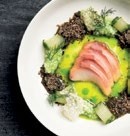Health food meet conservation at these stores.


What started out loosely as a metalstraw proselytising, cloth bag-carrying minority has grown into a massive movement to live an ecologically sound life. You really know it’s no longer a niche topic when the Prime Minister makes a special mention about climate change in the National Day Rally message.
In this green quest, food can play a huge part in making a change – according to 2014 data from Climate Watch, agriculture alone is responsible for roughly 10 per cent of all greenhouse gas emissions worldwide. And around the world, consumers are acknowledging the problem by turning to lab-grown meat. There are many other ways to vote with your wallet, as the sprout of eco-conscious food retailers here hope to prove.
FRIENDLY NEIGHBOURHOOD GROCER
There’s a wave of bulk food stores opening. The idea’s simple: The stores stock their products in loose form, and customers bring their own containers to load up, paying by weight. This minimises packaging and single-use plastics, while creating a situation where customers can buy only as much as they need so wastage is also reduced.
An outpost of Australia’s largest bulk foods retailer, The Source Bulk Foods brings zero-waste, sustainable shopping to the heart of Bukit Timah. The store stocks over 350 products, ranging from pantry staples like grains and cooking oil to a wide selection of healthy (and healthy-ish) snacks with options that cater to vegan, paleo, organic and gluten-free diets. There’s also a wide range of superfoods to pick from, including on-trend products like beef bone broth powder, spirulina, and even kombucha on tap. It’s not just food too – the store stocks naturalingredient cleaning supplies like lemon myrtle laundry powder and loose soap and shampoo bars.
INCREDIBLE BULK
Another brand coming in from Australia is Scoop Wholefoods, which opened in partnership with lifestyle group Gill Capital. The 4,400 sq ft store sources much of its offerings direct from Australian farmers and small-batch producers, in order to keep the supply chain as short as possible. Because it sources directly, and doesn’t spend on packaging, Scoop Wholefoods also offers organic products at a lower price compared to much of the market – this includes a wide range of products from grains and nuts to chocolate.
As part of its sustainability efforts, the store doesn’t print any brochures or fliers. All information on produce that it stocks is stored on an app that customers can download. Scoop Wholefoods also sells metal drinking straws at near-cost, in addition to containers made of bamboo and stainless steel. Even the owners are personally involved – Sajni Gill, one half of Gill Capital, will be conducting weekly workshops on sustainable living and options for plastic alternatives.
BUY BETTER
Little Farms has been catering to Singapore’s increasing desire to eat mindfully since 2016. While most of the items are various combinations of sustainably sourced, and ethically farmed, Little Farms also makes efforts to put eco-conscious practices into its operations. For one thing, the store uses paper bags instead of plastic, and reusable canvas bags are sold at cost to customers. All takeaway food from its cafe is packed in biodegradable containers made from sugarcane pulp that’s left over from sugar-processing. Meanwhile, edible, unsold produce and products are donated to the Food Bank.
Product highlights include Just Water, which channels a portion of profi ts back to improving water infrastructure; and Pacific Coast Eco Bananas, which are farmed using minimal-intervention methods to protect the soil they’re grown in.


Scoop Wholefoods offers many healthy sauces and spreads.

SAME SAME, BUT DIFFERENT

LOCAVORE AND JAPANESE
From the Spa Esprit group comes Noka, a farm-totable Japanese restaurant with its own 5,000 sq ft urban farm. Although there’s still a smattering of produce from Japan, including Niigata rice and seafood, many of the greens are sourced locally.

MINIMAL WASTE
Other times, sustainability comes in the form of efficient ingredient usage. Microbrewery Level 33 makes use of beer byproducts in its dishes. Think leftover malt being baked into bread, and wort vinaigrettes.























